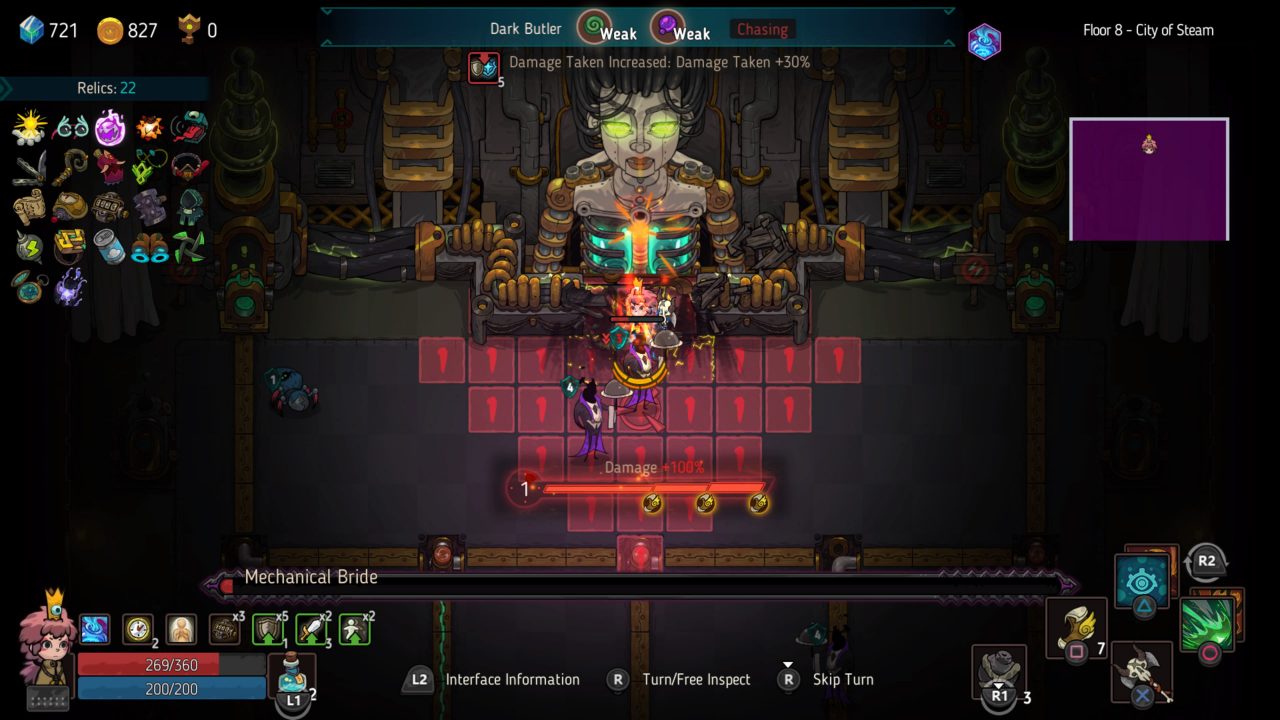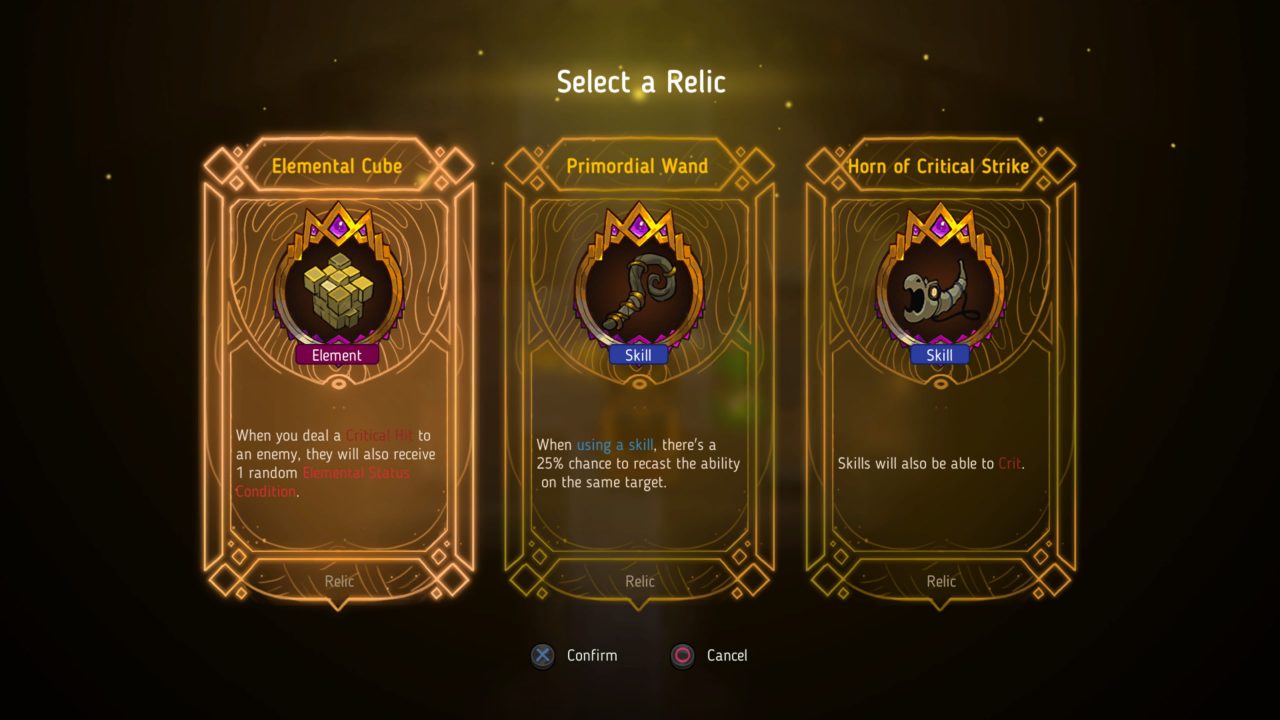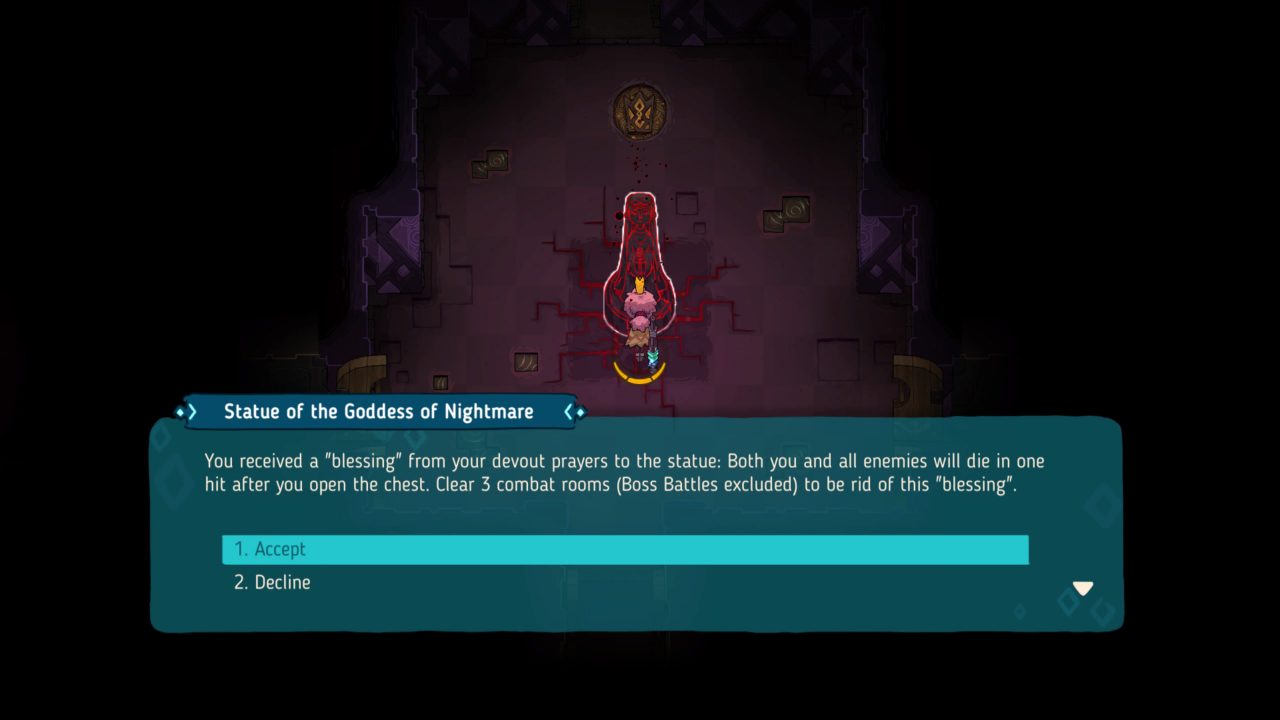Turn-based RPGs and roguelites are strange bedfellows. When I first heard that Crown Trick meshes elements of both genres, I was sure the combination would lead to disappointment. Still, I was intrigued. So when the game debuted on PlayStation 4, morbid curiosity got the better of me and I decided to give it a go, expecting an interesting but unplayable experiment.
And I’m glad I did, because NeXT Studios proved me very, very wrong. Partly thanks to its turn-based underpinnings, Crown Trick feels like playing a more thoughtful, tactical version of Hades—one brimming with multifaceted combat, progression systems I still struggle to stop thinking about, and a spirited aesthetic that kept me smiling even on my 40th wipe. Balance issues and dubious design choices dampen the experience, but Crown Trick is a testament to the compatibility of these two dissimilar genres and is the most addictive roguelite I’ve played all year.
In typical roguelite fashion, the game’s plot does little more than contextualize its real draw: dungeon-crawling. Nonetheless, it accomplishes that goal and offers ample charm along the way. You play a vibrantly pink-haired child named Elle who awakens in the realm of nightmares. Confused, she stumbles across the game’s titular crown. After she dons it, it comes to life and gives her the lay of the land. A baddie named Vlad has breached the nightmare realm’s seals of power, empowering his forces of destruction and violence to overpower both the realm and Elle’s world. The crown imbues Elle with special powers, and the pair ascend towering dungeons to vanquish Vlad and save both worlds.
Though Crown Trick opens darkly, it’s brimming with light-hearted silliness and snark that’ll keep you smiling. Nothing better exemplifies its engaging tone than does Elle’s relationship with the crown. At first, the pair are comically at odds; sweet, naive Elle and her perpetual optimism irritate the crown, which doubts Elle’s fitness to wear it and treats her with laugh-out-loud funny condescension. As Elle clears more of the nightmare realm, the crown begins to trust her and share amusing tidbits of lore that flesh out its dank world. By the final act, the pair are thick as thieves and finally resemble a team you’d expect to see in an RPG. Witnessing Elle and the crown’s endearing evolution was a heart-warming joy that helped keep me pining to play Crown Trick when I wasn’t.

It also doesn’t hurt that Crown Trick offers some of the most thought-provoking fun I’ve had in months. Unlike in almost every other roguelite, your enemies only move or attack when you do. If you sit still and do nothing, your foes follow suit. This gives you plenty of time to strategize your next move, something you’ll need to make a habit of if you want to surmount the game’s fairly punishing difficulty. Combat feels a lot like Superhot, except battles are turn-based and play out in hazard-laden rooms comprised of square tiles hearkening back to Fire Emblem games.
Though she’s cute as a button, Elle knows her way around a rifle, axe, sword, staff, and a slew of other deadly weapons. Each supports a distinct combat style that offers a dramatically different gameplay experience. Rifle shots winnow down your enemies from afar and penetrate those standing in a line, stave swings make up for their mediocre damage output by giving you a bit of range and enhancing your abilities, and axe swings unleash a whirlwind that’ll slice and dice enemies standing in any tile adjacent to your own. I preferred to safely pellet my enemies with rifle blasts from afar, but you’ll come across items and abilities that make many play styles viable.
Familiars are another way Crown Trick cleverly empowers you to shape Elle’s combat style to your liking. After defeating elite monsters called familiars and coming across a particular stone, you can equip a pair of their abilities. You run into this stone when you start each run and a few times thereafter, giving you plenty of opportunities to swap familiar abilities. Like weapons, these abilities run the gamut and cater to just about every flavor of dungeon crawler. Some grant you the power to unleash glorious, screen-filling AOE blasts, others paralyze, poison, or freeze your foes, and others stun any enemies bold enough to get in your face. The impressive diversity of weapons and familiar abilities kept me from feeling even a pang of boredom until well after I cleared all of Crown Trick’s dungeons. And even then, thanks to the game’s refreshing enemy AI, randomized, procedurally-generated dungeons, and boatload of unlockable weapons, familiars, and other goodies, I quickly quelled that pang.

As you climb the game’s dungeons, your collection of buffs, known as relics, will often determine whether you’ll persevere to the next room or head straight to the game-over screen. Borrowing heavily from Hades‘s boons, relics are items you come across as you clear bosses and groups of enemies that gift you a passive buff for the rest of your run. Think increased critical hit chance, enhanced damage for a few turns after eliminating an enemy, a chance to dodge physical and magic attacks, and other minor but meaningful tweaks. Relics I collected often shaped my battle strategy, and they imbued most runs with a distinct flavor that kept me coming back for more well after I scaled all the game’s dungeons.
Nonetheless, balance issues plague the otherwise absorbing combat. Certain weapon types are just head-scratchers. Dual blades, for one, require you to walk right up to your enemies to wail on them, typically guaranteeing you’ll suffer a hit or two in the process. Dozens of enemies occupy each dungeon floor, so those hits add up quickly. Familiars are also not exactly created equal; more than a few offer you bafflingly unhelpful abilities and feel like unfinished filler. Elle randomly chooses between her available weapons and familiars at the beginning of every dungeon crawl, and I spent an inordinate chunk of time repeatedly restarting my runs until I was pleased with her choices. Perhaps I could’ve spent this time enjoying the game if NExT Studios had better balanced weapons and familiars.
Even when you boast game-changing relics and a wicked combo of familiars and weapons, the denizens of Crown Trick‘s dungeons will still often get the better of you. Each wipe sends you back to home base—the Hall of Reincarnation—to start a new run from scratch, with the exception of any soul shards you’ve collected. You can cash these in for upgrades ranging from beefed-up damage and defense to a shot at scooping up better weapons and more items mid-dungeon.
Meta-progression in roguelites is polarizing, but I appreciate that it rendered nearly all my runs productive. I say nearly because of one particularly frustrating design choice: if you leave the Hall of Reincarnation before spending the shards you earned on your preceding run, you lose a significant portion of them. Often, I was carrying a few hundred shards, but available upgrades cost a bit more, so the game compelled me to forfeit my hard-earned shards if I wanted to keep playing. This mechanic only ever irritated me and struck me as a lazy attempt by NExT Studios to drag out player progression.

Though Crown Trick’s visuals won’t stretch your hardware, they reek of charm that’s tough to look away from. Boss, enemy, and NPC designs are intricately detailed, sport a heaping helping of character, and complement the game’s light-hearted, mischievous tone. The art design behind Elle and many of the game’s familiars are particularly impressive and reflect talent rivaling that at a much bigger, better-funded studio. Still, dungeon environments feel samey once you realize they consist of a castle design, ocean design, and little else. I also unwittingly waltzed into more than a few tiles covered with elemental status conditions that were way too subtle to spot.
The soundtrack is solid but less stellar. Consistent with its tone, the game’s background music is energizing and a tad menacing, reminiscent of The Nightmare Before Christmas. It accentuates the game’s grim silliness, but almost none of it’s memorable or moving. Battle sound effects similarly get the job done but do little more. None of the characters are voiced, which is disappointing but understanding for an indie game.
Minor gripes aside, Crown Trick surpassed my expectations and taught me much about what two of my favorite genres can achieve. Though the game is undoubtedly derivative of Hades and other recent roguelites, it establishes a character, charm, and gameplay style all its own that are genuinely standout. Its combat and progression systems are among the deepest and most satisfying I’ve encountered all year, and its turn-based mechanics instill its gameplay with a thoughtfulness I wish other roguelites would emulate. For delivering dozens of hours of the most engaging dungeon-crawling you may find this year, this game truly earns its crown.


